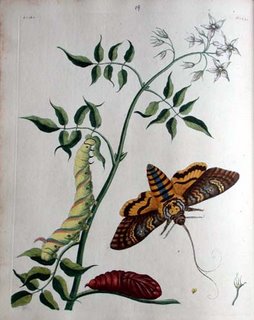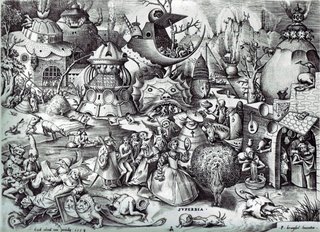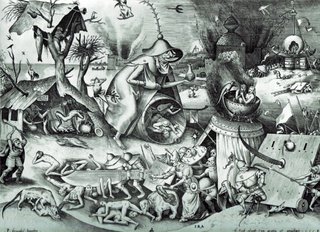Thus in truth the Comedy is a picture of earthly life. The human world in all its breadth and depth is gathered into the structure of the hereafter and there it stands: complete, unfalsified, yet encompassed in an eternal order; the confusion of earthly affairs is not concealed or attenuated or immaterialized, but preserved in full evidence and grounded in a plan which embraces it and raises it above all contingency. Doctrine and fantasy, history and myth are woven into an almost inextricable skein....Once one has succeeded in surveying the whole, the hundred cantos, with their radiant terza rima, their perpetual binding and loosing, reveal the dreamlike lightness and remoteness of a perfection that seems to hover over us like a dance of unearthly figures.
Tuesday, January 30, 2007
Auerbach on the Commedia
Monday, January 29, 2007
Ovidian Envy
Here is Ovid's portrait of Envy, taken from the story of Aglauros in Book II of the Metamorphoses. Pallas Athena has gone to Envy's cave to command Envy to poison Aglauros:
Envy could be seen, eating vipers’ meat that fed her venom, and at the sight the goddess averted her eyes. But the other got up slowly from the ground, leaving the half-eaten snake flesh, and came forward with sluggish steps. When she saw the goddess dressed in her armour and her beauty, she moaned and frowned as she sighed. Pallor spreads over her face, and all her body shrivels.
Her sight is skewed, her teeth are livid with decay, her breast is green with bile, and her tongue is suffused with venom. She only smiles at the sight of suffering. She never sleeps, excited by watchful cares. She finds men’s successes disagreeable, and pines away at the sight. She gnaws and being gnawed is also her own punishment. Though she hated her so, nevertheless Tritonia spoke briefly to her. ‘Poison one of Cecrops’s daughters with your venom. That is the task. Aglauros is the one.’Without more words she fled and with a thrust of her spear sprang from the earth.
Envy, squinting at her as she flees, gives out low mutterings, sorry to think of Minerva’s coming success. She takes her staff bound with strands of briar, and sets out, shrouded in gloomy clouds. Wherever she passes she tramples the flower-filled fields, withers the grass, blasts the highest treetops and poisons homes, cities and peoples with her breath. At last she sees Athens, Tritonia’s city, flourishing with arts and riches and leisured peace. She can hardly hold back her tears because she sees nothing tearful.
Sunday, January 28, 2007
Athens 1941
The World War II experiences of Dr. Peter Gram of our group have been featured in an interview with the local paper. He's also written about them in his book, Memoirs of Greece: The Years of the Nazi Occupation (1941-1944), Congratulations Peter!
Wednesday, January 24, 2007
A few of the Seven Deadlies Illustrated
Monday, January 22, 2007
Augustine on Envy

Now these brothers, Cain and Abel, were not both animated by the same earthly desires, nor did the murderer envy the other because he feared that, by both ruling, his own dominion would be curtailed -- for Abel was not solicitous to rule in that city which his brother built -- he was moved by that diabolical, envious hatred with which the evil regard the good, for no other reason than because they are good while themselves are evil. For the possession of goodness is by no means diminished by being shared with a partner either permanent or temporarily assumed; on the contrary, the possession of goodness is increased in proportion to the concord and charity of each of those who share it. In short, he who is unwilling to share this possession cannot have it; and he who is most willing to admit others to a share of it will have the greatest abundance to himself. The quarrel, then, between Romulus and Remus shows how the earthly city is divided against itself; that which fell out between Cain and Abel illustrated the hatred that subsists between the two cities, that of God and that of men. City of God XV.5
Sunday, January 21, 2007
Purgatorio 14
If time allows, after reading Purgatorio 14, pay another visit to Inferno 13 -- you might find some fascinating echoes, parallels, differences.
Also: Much to explore in this canto - what do you make of the examples of envy - only two are given - in lines 133-141. Cain and Aglauros arrive with the sound of thunder:
Finally, remember that we meet in North Library on Wednesday, 10:15 a.m.
Also: Much to explore in this canto - what do you make of the examples of envy - only two are given - in lines 133-141. Cain and Aglauros arrive with the sound of thunder:
Poi fummo fatti soli procedendo,
folgore parve quando l'aere fende,
voce che giunse di contra dicendo:
'Anciderammi qualunque m'apprende';
e fuggì come tuon che si dilegua,
se sùbito la nuvola scoscende.
Come da lei l'udir nostro ebbe triegua,
ed ecco l'altra con sì gran fracasso,
che somigliò tonar che tosto segua:
«Io sono Aglauro che divenni sasso»;
e allor, per ristrignermi al poeta,
in destro feci, e non innanzi, il passo.
Finally, remember that we meet in North Library on Wednesday, 10:15 a.m.
Friday, January 19, 2007
From the horse's mouth
"What we're seeing is the top 1% struggling to keep up with the top 1/10th of 1%," he adds. "And those people trying to keep up with the top 1/100th of 1%. There is a drive by the merely rich to keep up with the obscenely rich." Dalton Conley, a sociologist at New York University who studies status (Wall St. Journal - subscription req'd.)
Thursday, January 18, 2007
Purgatorio 13: A few notes
There are notable differences in medium and spatial orientation, among others, between the Terrace of Envy and that of Pride.
First off, where the Terrace of Pride had white bas-reliefs and a marble path of divinely wrought images, the first glimpse of Envy's domain is of a bleak, livid space with no one in sight.
The words occhi (eyes) and videre (seeing, sight) appear numerous times in this canto, but what's striking is what is not seen - the invisibile parlare, we might call it, of the voices that rush past Dante and Virgil as they approach the band of sinners.
Why are the eyes of the envious sealed "like hawks"?
Why, when Dante asks if one of them is Italian, is he told that all are "citizens of one true city"? Why does the theme of the City of God, versus the City of Man, surface here amid the envious?
Singleton notes yet another element of Dante's realism: La Sapia knows Dante is alive because, with the extra sensitivity of the blind, she hears him breathing, while she and the others have no idea of Virgil's presence.
La Sapia is overjoyed at the defeat of her fellow citizens in the battle of Colle, some of which she might have seen from her husband's castle. It was this battle in which Provenzan Salvani, met on the previous terrace, was killed.
First off, where the Terrace of Pride had white bas-reliefs and a marble path of divinely wrought images, the first glimpse of Envy's domain is of a bleak, livid space with no one in sight.
The words occhi (eyes) and videre (seeing, sight) appear numerous times in this canto, but what's striking is what is not seen - the invisibile parlare, we might call it, of the voices that rush past Dante and Virgil as they approach the band of sinners.
Why are the eyes of the envious sealed "like hawks"?
Why, when Dante asks if one of them is Italian, is he told that all are "citizens of one true city"? Why does the theme of the City of God, versus the City of Man, surface here amid the envious?
Singleton notes yet another element of Dante's realism: La Sapia knows Dante is alive because, with the extra sensitivity of the blind, she hears him breathing, while she and the others have no idea of Virgil's presence.
La Sapia is overjoyed at the defeat of her fellow citizens in the battle of Colle, some of which she might have seen from her husband's castle. It was this battle in which Provenzan Salvani, met on the previous terrace, was killed.
Monday, January 08, 2007
A couple of quick reminders

Do remember we are now meeting at the North Library, beginning this Wednesday. Also, just to recall a few notes here that were made a while back:
On Canto 11
On Canto 12
Wednesday, January 03, 2007
Canto 10: Worms and Butterflies

O superbi cristian, miseri lassi,
Che, de la vista de la mente infermi,
Fidanza avete ne’ retrosi passi,
Non v’accogete voi che noi siam vermi
Nati a formar l’angelica farfalla,
Che vola a la giustizia sanza schermi?
~~~
Che, de la vista de la mente infermi,
Fidanza avete ne’ retrosi passi,
Non v’accogete voi che noi siam vermi
Nati a formar l’angelica farfalla,
Che vola a la giustizia sanza schermi?
~~~
O Christians, arrogant, exhausted, wretched,
whose intellects are sick and cannot see
who place your faith in backward steps,
do you not know that we are worms and born
to form the angelic butterfly that soars,
without defenses, to confront His judgment?
(Purgatorio X. 121-26)
whose intellects are sick and cannot see
who place your faith in backward steps,
do you not know that we are worms and born
to form the angelic butterfly that soars,
without defenses, to confront His judgment?
(Purgatorio X. 121-26)
The paradoxical consciousness of the worm that "knows" it has another destiny, a destiny in which it is radically an other. What weight should we give to the difference between worms that become butterflies, as occurs in nature, and worms "born to form" an angelic butterfly?
Moral dilemma: If the worm forgets it is a worm, it inflates into a false consciousness of its true destiny: Pride. But if the worm forgets its ultimate and truest being, it commits to remaining a worm, demoralized and despairing.
This creature does not know how it goes from worm to butterfly. Does it require divine aid? Something beyond its -- our -- own nature?
What is suggested by the fact that this angelic butterfly flies up to Justice "without defenses"?
Subscribe to:
Comments (Atom)



